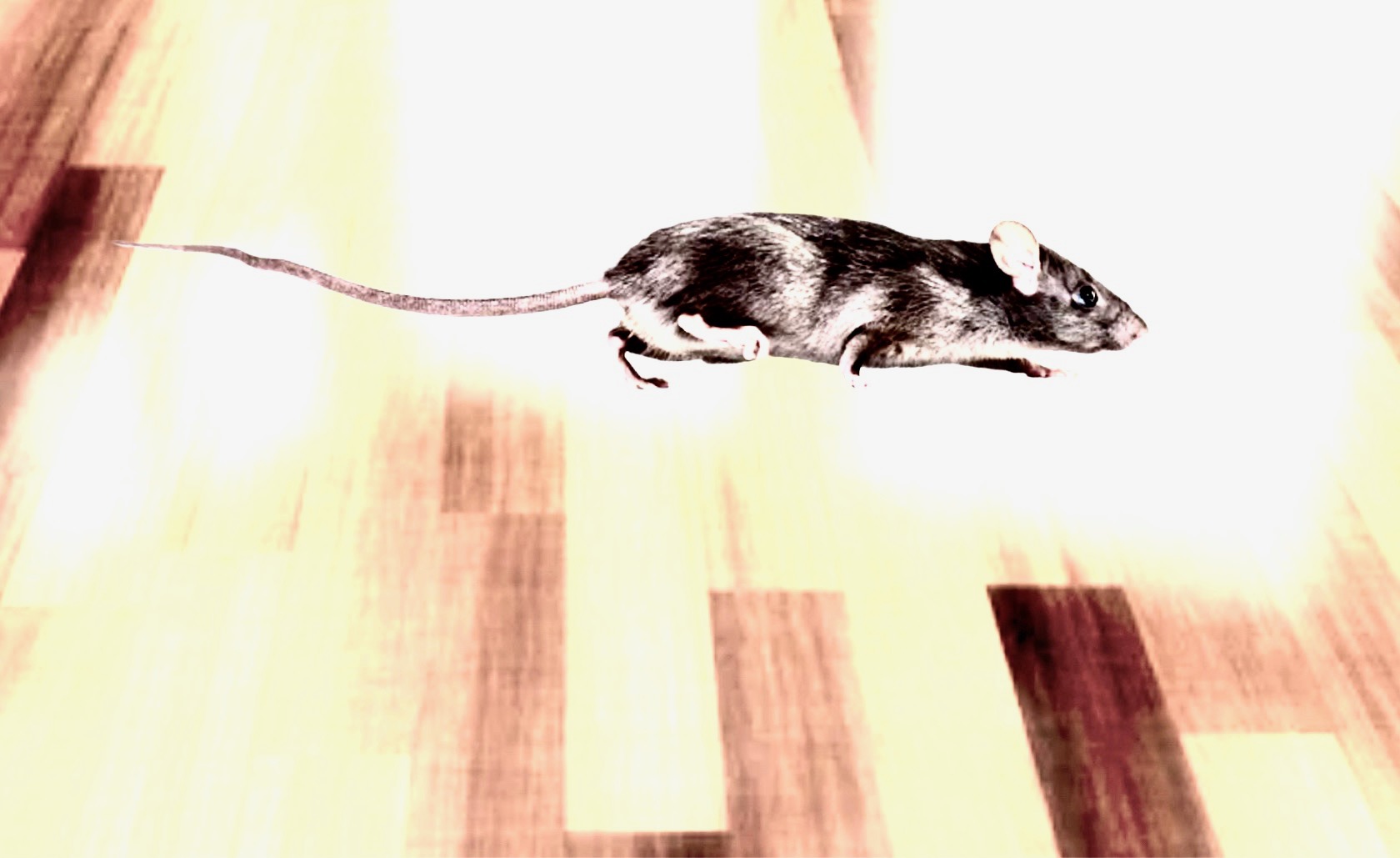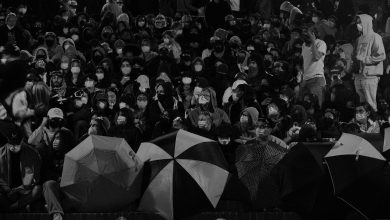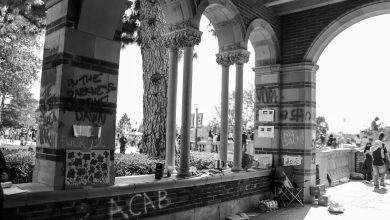Rat on Polished Wood

Design by Coral Utnehmer
Image Description: An illustration of a gray rat on top of a glowing wooden floor.
A powdery cardboard scent puffs through the airways of the door. At least one of us is exhaling. It greets my nose before I can shake hands with the knob, as if introduction is necessary. My eyes feel as though they are taped shut, which is the only reason I can see this room for what it is: a cardboard box. It is turned on its side, as if it has been knocked over and all the items are spilling out. My bedroom walls are made of thick brown paper, like the shoebox dollhouses Camila and I made as children. Shoeboxes were our hot commodity, and since we didn’t get shoes often, we began soliciting neighbors. We claimed we were collecting for the purpose of recycling, and this was not entirely a lie. We just didn’t want them to know we were poor. Plus, the boxes were damned to the dumpsters before they found homes in our little hands, and from them, we made homes for little plastic dolls. We drew on toilets and tabletops and stretched the juice of our markers to shade in furniture until the cardboard could no longer pick up our traces. Sometimes, we’d even rummage through our mother’s bookbag for extra markers she’d brought to substitute at school. On our 12th birthday, we got a real doll house, one with 3 stories and an elevator, but by then we’d long retired playing. I could sense our mutual disappointment that this present was years too late via twin telepathy. That, and her eyes clung to mine like masking tape, repeating that we love it to parents who were proud they could finally gift what we wanted.
Acknowledging that my room is not actually made of paper, I force my eyes open, ripping off the metaphorical scotch tape like a bandaid. I don’t see my bedroom as a cardboard box, but I do still feel that it is. Both pack everything you have into a cube. Leaving this cube is a lonely thought, but leaving with only a few smaller cubes is an even worse one.
When I swing the door open, it wafts out that dusty scent, then the familiar smell of Camila’s raspberry shampoo from her freshly washed hair, then insinuating words of, “How was orientation?” Even her smile bombards me in suffocating gusts as I stand there dumbly in the doorway. How was it? How was orientation? How was standing there with our tattered-blue-jeaned-father in dark brown lecture halls that rang of illustrious speech? I learned that word while I was there, and I’m not even sure I’m using it correctly.
“Embarrassing.”
“What? Why?” she asks from the top bunk. Her confusion angers me. I’d rather not explain the cold empty feeling of looking like a city rat on a wealthy campus. The image of myself as a plump, leaking rodent on polished wooden floors echoed in my thoughts the entire car ride back, as if my mind were a sewage, one I carried everywhere I went because dirty tunnels are simply the architecture of my thinking.
“Because. It just was. Everyone there had perfectly white smiles, like the kind you see in brochures,” I mutter as I toss my Jansport bag to the ground and make my way toward the empty boxes at the opening of the closet. “Actually, they had perfectly white everything— perfectly white hair on gorgeous wearing alumni pins, perfectly white sweaters tied on perfect shoulders like they’re on a perfectly white yacht— Camila, they were just all white and fucking perfect, okay?!”
“Okay,” she states plainly and diverts her attention so that I don’t suffocate under her gaze. I don’t want space. I want comfort. I want to be told that I will fit in, or even that it doesn’t matter if my outdated outfits are a dead giveaway that I am here on donated and borrowed money, like a charity case. I let the silence boil as I pick mismatched graphic tees off of colorful plastic hangers, imagining this is a bouquet of rainbow-dyed carnations and each shirt picked is a petal, at which I question, will this make them love me or love me not? Every answer is a no. There is no alternating.
“Carmen! You can’t just take everything in the closet!” she exclaims, sitting up quickly and almost hitting the ceiling with her head. “You realize I still have to get dressed when you’re away at college, right?”
“You’re going to school down the street, you barely even have to leave home. It’s not fair to split all the clothes evenly. I’m going to be out way more often. Plus, the kids there are going to notice if I’m wearing the same six outfits over and over, I bet the dorm dressers won’t even be large enough to fit all their clothes.” I make my case but not without the guilt of a lawyer who knows they are on the wrong side. Having a twin has meant that we’ve shared everything, which has really meant that I’ve had nothing. Nothing that was entirely, undividedly, my own, that is. Still, I know it’s wrong to take the majority of our clothes out of fear that I won’t have enough.
“Carmen, no one’s gonna be paying attention to what you’re wearing. You’ll be okay,” she says to me like I am absolutely ridiculous. I can hear her thinking, you are so dramatic Carmen, and I wonder if she blames these traits on my impractical interest in Performance Studies, as if I can financially afford to not be a STEM major or morally afford to not be a Sociology major.
“You didn’t see how they were dressed,” I say as I stop picking petals of clothing. It’s no use. Both halves of this wardrobe are old. The entire thing put together is still not much, and stripping this closet won’t clothe my longing heart.
I begin putting shirts back one at a time. Despite the implications of my attitude, I’m not mad at her. I‘m mad that she isn’t going to Tufts with me because I can tell this is going to be terribly lonely. Even more so, I’m mad that she isn’t just a little more selfish because then she’d have applied to private universities like Tufts in the first place and wouldn’t be going to community college to help our parents financially. Actually, I’m mad that I’m not less selfish, because then I wouldn’t have applied either and would be joining her at Springfield Technical Community College in the Fall, and I could stay in this comfortably run-down room that was small and shared, but resembled a nook that I actually fit into. I reprimand myself for sounding so ungrateful. The night I got this acceptance, I watched glittering tears roll down my parents’ glowing skin, like the white light of the computer was heaven-sent. The letter was an angel sat before us, brightening my father’s dark face that had labored beneath the sun for years, in hopes that someday it would see merciful light, and that night it did. I remember him kissing the cross that dangled from his neck first, and the top of my forehead second. It was as if God had a greater role in this doing than I. Somehow, this was not at all offensive to me. Elite education (or education at all) was such a distant hope of his that it was like mercy had been granted, and it hadn’t come fast enough to reach him, but it arrived nonetheless, for me.
My mind, the poor sewer tunnel it is, has loads of dirty water rushing through. I must need repairing because it begins leaking through my tear ducts. That’s when warm hands wrap around me, right there on the carpet. It is so blood-close like bodies in a womb, I wonder if I can ever leave it behind. I wonder if I was pre-destined to feel reliant and to seek closeness like this because I’ve spent my life coiled. I was coiled with Camila like slinkies in our mother’s stomach, in small apartment rooms, and on rainy days that overflowed my underground waste like today.
“I’m worried,” I tell her. She always waits for me to talk first, and I appreciate her patience. She has great emotional intelligence and will do well as an elementary teacher. I often feel immense guilt for not wanting to dedicate my life to my community as she does. She is the less dramatic of us two, and I’ve always thought that to be a good thing for her sake. Even her emotions seem to be right where they belong, and I wish I had her stability. She is like an anchor declaring her place in the great ocean by choosing a spot in the sand, and staying there.
“You’re only worried because you know you’re going somewhere much further than where you are now.” She says, and she tells me that I am a traveler and that it is okay to feel like I’m losing my sense of belonging amidst open roads. She begins filling my boxes with pairs of jeans, half of our blouses, and little trinkets. Her metaphor not only makes me feel companionless but guilty. Why should I have the right to pursue liberal arts while our dad is stuck endlessly filling streets with cement? I imagine myself using words like “illustrious” in the Balch Arena Theater watching waves of tule swirl the stage, just as he is arriving home and tossing keys on the counter with mudded hands.
“Don’t you think it’s wrong of me to be wasting all our family’s mercy on studying the arts?” I ask.
“What do you mean ‘our mercy’?” she asks.
“Did you see Papa when he found out I was going to a real university? It broke my heart. I was just thinking the entire time, you can’t squander this Carmen, you’re the beacon of hope for your struggling family, and then I looked at the letter again and remembered I applied to Performance Studies and realized I already have squandered it.”
“Oh. I thought he was crying because you have freedom now,” she says through furrowed eyebrows.
“Exactly, and I’m wasting the opportunity on something that won’t even support me.”
“No, not financial freedom. I mean like, real freedom. You can choose where you want to go and do something fulfilling. He knows better than anyone what it’s like to slave away at something just for money. He never wanted that for us.”
“How can I let him continue to work like that while I prance around learning about stage direction? I don’t want to leave him behind, and I just don’t want to stand there alone.”
“If you know him at all, you should know the one thing you could do to fulfill him is to fulfill yourself. He’d feel like a complete failure if you wasted away your life on something mundane just to make a living. Plus, I’m sure the kids at Tufts will act just as ridiculous as you. You won’t have any issues fitting in.” She smiles taping up a full box and setting it against the white wall with the pasta stain from a previous food fight. She’s right, perhaps I will have overreaction in common for once. “You’ll find a community you fit in with.”
“I already have one here and if I weren’t so selfish, I’d be with you and mom at the elementary school,” I admit shamefully. “And I’d feel a lot safer too because I wouldn’t have to leave at all.”
“Well, I’m going into teaching because it actually feels like my purpose. You can’t force purpose. You’re theatrical, you need to be off doing embarrassingly theatrical things. I couldn’t handle having you attached to my hip 24/7 anyway,” she says. My eyes cling to the singular box of tops. It seems out of character for me to obsess over something as superficial as clothing. Really, it isn’t about clothing at all. I’ve long turned to belongings for comfort and nostalgia because they belong to me, but in most ways, I realize, I belong to them.
In the coming days, I realize I’ve packed far too early. I don’t want to undo the tape, so I decide to live frugally. I wear the same two outfits around Springfield and say goodbye to everyone at least once a day. The employees at the market hugged me tightly and joked that I’d said goodbye so many times in a row, they weren’t even sure if I’d leave at all. I laughed at this but thought maybe they were right, maybe I’d just stay. One night the streets flood because of broken pipes in the buildings. I think of how full that sewage must be and the cold feeling entices me to reach for another blanket, but my favorite is packed away and I must rely on my thoughts to be a source of warmth and comfort. This is when I realize I have been unaccompanied by my belongings for weeks now, and in this naked goodbye, I have actually felt the greatest sense of belonging. Then, the flooding stopped, and I began to wonder about the polished wood flooring instead.




